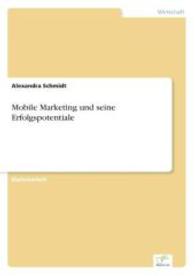- ホーム
- > 洋書
- > ドイツ書
- > Social Sciences, Jurisprudence & Economy
- > Environment, Agriculture, Forestry
- > Environment
Full Description
This book is a compilation of recent developments in land, ecosystem, and water management in the Brazilian state of Rio de Janeiro. The state is located in the biodiversity hotspot of the Atlantic Forest (Mata Atlântica), a biome characterized by high biological diversity and endemism. At the same time the state of Rio de Janeiro emerged to one of the economic hubs in Latin America. This development process has been accompanied by population growth, industrialization, urbanization, as well as consumption and degradation of land and water resources. In the past years many efforts have been made to stop or at least slow down these degradation processes and restore degraded environments with the overall goal to bring together sustainable management of natural resources, nature conservation, and economic development.
An overview is provided of the different strategies and tools that have been developed in the fields of agriculture, ecosystem management and biodiversity, integrated water management, land restoration, disaster risk reduction and climate change adaptation, as well as environmental governance and economic instruments. This book covers a wide spectrum from applied research to science-policy interfaces, planning concepts, and technical tools and has a model character for other rural areas in Latin America. Target groups are scientists, practitioners, policy makers and graduate students in the field of environmental management. The different chapters are written by researchers and practitioners of the German-Brazilian project INTECRAL (Integrated Eco Technologies and Services for a Sustainable Rural Rio de Janeiro), the rural development program Rio Rural under the state secretary for agriculture and animal husbandry, as well as invited scientists from Brazilian universities and research institutes. It bridges existing gaps between science, policies, and practice in rural development.
Contents
Chapter 1. Rio de Janeiro: A State in Socio-ecological Transformation.- Chapter 2. Environmental History, Forests and Landscape Uses in Rio de Janeiro State.- Chapter 3. Sustainable Rural Development in Rio de Janeiro State: The RIO RURAL Program.- Chapter 4. The INTECRAL Project.- PART I: Agricultural Management.- Chapter 5. Soil and Water Management for Ecosystem Services Provision in Agricultural Landscapes: The Challenge of Monitoring.- Chapter 6. Spatial Patterns of Farmland Abandonment in Rio de Janeiro State.- Chapter 7. From Design to Implementation: A Participatory Appraisal for Silvopastoral Systems.- Chapter 8. Towards Good Agricultural Practices in Smallholders Dairy Production Systems from an Animal Welfare Perspective.- Chapter 9. Adequate Harvesting Technology for Small and Medium Scale Sugarcane Farmers in Rio de Janeiro: The "Cologne Solution".- PART II: Ecosystem Management and Biodiversity Conservation.- Chapter 10. Integrating Biodiversity Conservation into Agroecosystem Management: Using Birds to Bring Conservation and Agricultural Production Together.- Chapter 11. Connectivity Conservation Management: Linking Private Protected Areas.- Chapter 12. Applicability of the German Hydromorphological Assessment Approach to Tropical Rivers.- Chapter 13. Use of Native Plant Species for Ecological Restoration and Rehabilitation Measures in Southeast Brazil.- Chapter 14. Use and Conservation of the Threatened Brazilian National Tree Paubrasilia echinata Lam.: A Potential for Rio de Janeiro State?.- PART III: Integrated Water Management.- Chapter 15. Water Security in Rio de Janeiro State.- Chapter 16. Analyzing Hydro-climatic Data to Improve Hydrological Understanding in Rural Rio de Janeiro, Southeast Brazil.- Chapter 17. Ecohydrological Modeling and Scenario Impact Assessment in Rural Rio de Janeiro.- Chapter 18. Reuse-Oriented Decentralized Wastewater and Sewage Sludge Treatment for Small Urbanized Rural Settlements in Brazil: An Environmental Cost-Benefit Analysis.- Chapter 19. A Tool to Assess Land Use Impacts on Surface Water Quality: Case Study from the Guapi-Macacu River Basin in Rio de Janeiro.- PART IV: Land restoration, disaster risk reduction and climate change adaptation.- Chapter 20. Natural Hazards and Climate Change Impacts in the State of Rio de Janeiro: A Landscape Historical Analysis.- Chapter 21. Disaster Risk Management in the State of Rio de Janeiro.- Chapter 22. Ecosystem-Based Approaches for Disaster Risk Reduction and Climate Change Adaptation in Rio de Janeiro State.- Chapter 23. Integrated Participatory Methodologies for Disaster Risk Reduction - Tools to Analyze Complex Systems through Participatory Processes in Brazil.- Chapter 24. Soil Degradation in Southeast Brazil: A Challenge for Restoration and Rehabilitation.- Chapter 25. Rehabilitation of Degraded Sloped Pastures - Lessons Learned in Itaocara, Rio de Janeiro.- Chapter 26. Multi-criteria Site Prioritization for Land Rehabilitation in the Guapi-MacacuWatershed, Rio de Janeiro.- PART V: Environmental governance and economic instruments.- Chapter 27. Evolution of Public Policies and Local Innovation in Landscape Conservation in Rio de Janeiro.- Chapter 28. Promoting Sustainable Agriculture, Boosting Productivity and Enhancing Climate Mitigation and Adaptation Through the RIO RURAL Program, Brazil.- Chapter 29. Promotion of Alternative Income Diversification in Rural Rio de Janeiro: Making Use of Innovation Resources.- Chapter 30. Regional Marketing Strategies for Sustainable Production in Rio de Janeiro State.- Part VI: Conclusions.- Chapter 31. Rural Rio de Janeiro: Over the Hills and Far Away?.






